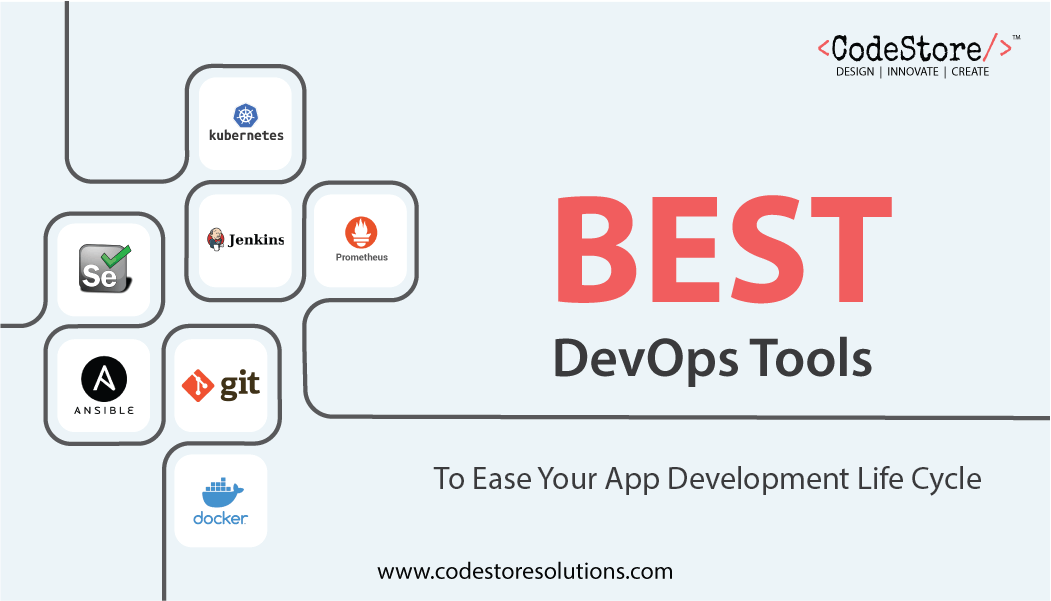Introduction
DevOps is a set of practices that integrates IT operations and software development together. This allows organizations to release new software and make changes to users as soon as possible, using automation. Due to the quick adoption of DevOps practices, many DevOps tools have recently been in higher demand.
DevOps software tools make sure automation, transparency, and collaboration remain at the focus of your value stream. These tools also help in promoting several methods for transferring information and technical knowledge effectively and efficiently among all the stakeholders, whether it is security, development, business, or operation teams for an efficient product outcome.
Many DevOps automation tools are also available these days as the necessity of popular DevOps needs. Stakeholders find it tough to choose any one among all these efficient DevOps automation tools. Hence, the CodeStore team has come up with a list of some of the most popular and efficient DevOps automation tools to adopt.
Popular DevOps Automation Tools You Should Know For Better Business Flow
With the advancement in technology, many DevOps automation tools have recently been in greater demand. These tools help in ease of development and better collaboration. Planning to remodel your DevOps technique? Then, take a look at these major DevOps automation tools that you must never ignore.
DevOps CI/CD and configuration management tools
Ansible
Developers made the Ansible tool for the automation process and collaboration. This simply helps to integrate and automate testing, development, performance handling, and better deployment. This also helps in increasing productivity.
Ansible makes in making the whole app development life cycle process automated and also helps in avoiding complexity at every phase.
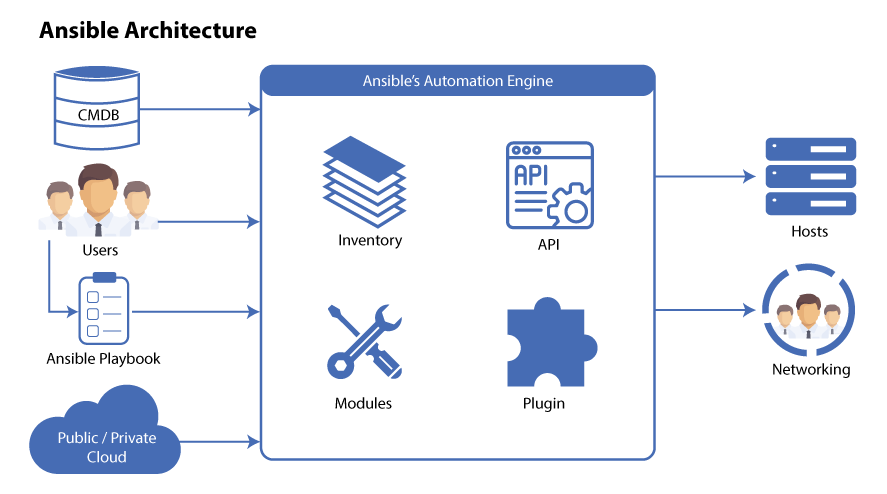
Ansible is a radically simple IT automation engine that automates cloud provisioning, configuration management, application deployment, intra-service orchestration, and many other needs.
Key Features of Ansible:-
- Helps in multi-tier app development.
- Moreover, Helps in better handling of systems and abstain from complexity.
- Made to be authentic, simple, and stable for configuration handling.
- Above all, Ansible helps in reducing the risk of unwanted glitches.
Jenkins
Jenkins is a constant integration server tool that is used for repeating and executing different jobs. The developers deploy this software on the core server where software development is done. Being one of the most common open-source ruling automation servers, Moreover, Jenkin’s automation engine allows DevOps teams to access and integrate the project changes easily and detect the issues instantly.
Jenkins is tailor-made for projects of all sizes and complexity. Developers can write this in Java. Moreover, hundreds of add-ons and plug-ins are available for Jenkins.
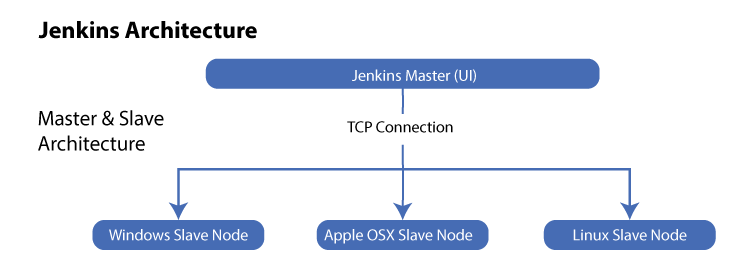
Jenkins uses the master-slave architecture for managing builds that are distributed. Moreover, In this distributed form, communication between master and slave happens using TCP/IP.
Key Features of Jenkins:-
- Jenkins features constant integration and delivery.
- This makes a script for integrating different workflows into a single pipeline.
- One can easily set up and configure Jenkins easily via a web interface.
- Jenkins is known as one of the easiest tools to get started with DevOps.
- Moreover, This contains Java-based ready-to-run programs that one can run on OS X, Windows, Mac, and other UNIX operating systems.
Monitoring, alerting and incident response tools
Prometheus
Prometheus is a community-driven and open-source system and performance monitoring toolkit. It completely depends on a time series model and makes alerts based on it. Moreover, it supports container monitoring. Above all, This monitoring process of Prometheus is extensively used within DevOps terms and cloud firms.

The Prometheus architecture is composed of multiple components, each of them providing a specific function. Above all, The components of Prometheus include Prometheus Server, Client Libraries and Exporters, Push Gateway, Alert Manager, Visualization.
Key Features of Prometheus:-
- Prometheus is very easy to customize.
- Consists of a flexible query language.
- Keeps tabs on multiple microservices.
- Prometheus contains reporting capacities via PromQL.
- Prometheus creates metrics without affecting the application performance.
Also Read:– DevOps – Trends and Future Benefits
Source Code Control
Git
Git is one of the most favorable tools for open-source contributors and remote teams. It is basically a distributed SCM (Source Code Management) tool that enables developers to track the advancement of their app development by maintaining various source code versions. Developers can simply return to the previous version if needed.
Currently, there are 2 popular Git repository hosting services available, and they are GitBucket and GitHub. GitBucket offers unlimited private repositories for a team of up to 5 members, whereas GitHub offers free access to public repositories only.
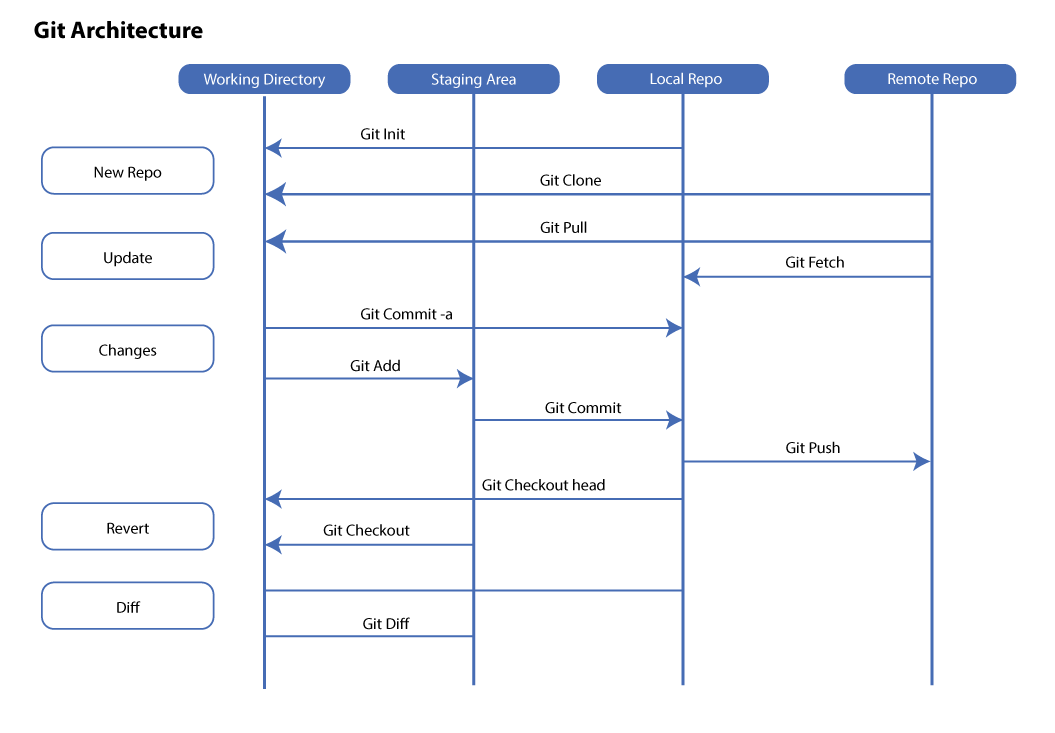
Git is essentially a content-addressable file system made up of objects that form a hierarchy that mirrors the content’s filesystem tree. Git has three main primitive types, which it uses to represent content for a repository, tree, blobs, and other commits.
Key Features of Git:-
- Features branch workflow.
- It allows a quicker release cycle.
- It aids pull requests.
- Enables distributed development.
- It’s a free open-source DevOps tool.
Testing Software
Selenium
Selenium is mainly used for automating web-based apps. It can automate testing and administrative tasks of web-based apps. This consists of 3 major components, and they are:-
Grid:- This runs tests on various devices to scale up the testing efforts and handle many environments from the core point.
IDE: – It’s simply a chrome and firefox add-on that helps in easy record and playback of interactions with the browser.
WebDriver:- This enables one to make unique, browser-based regression automation suites and examines and helps to scale and distribute scripts throughout several environments.
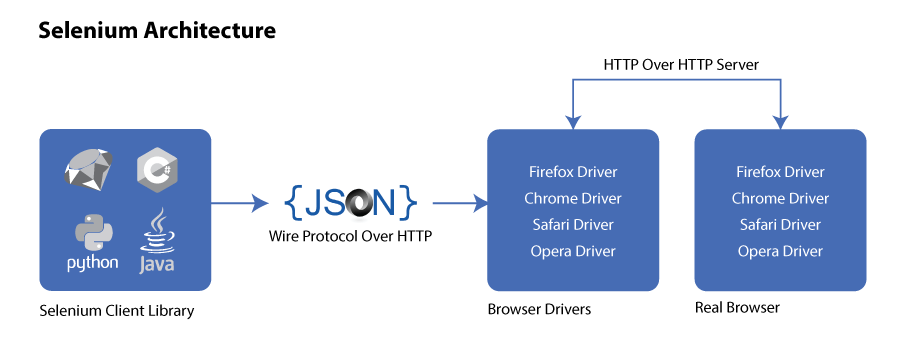
The Selenium WebDriver API enables interaction between browsers and browser drivers. The selenium architecture contains 4 layers called, Selenium Client Library, JSON Wire Protocol, Browser Drivers, and Browsers.
Key Features Of Selenium:-
- Creates scalable scripts.
- Helps in utilizing the same script in various environments.
- One can build testing scripts in various languages, such as C#, PHP, Python, JavaScript, and many more.
Container Platform
Docker
Docker is an open-source containerization platform. It enables developers to package applications into containers—standardized executable components combining application source code with the operating system (OS) libraries and dependencies required to run that code in any environment.
With the help of the Docker engine, one can access the containers, which, as a result, can execute apps in a remote environment.
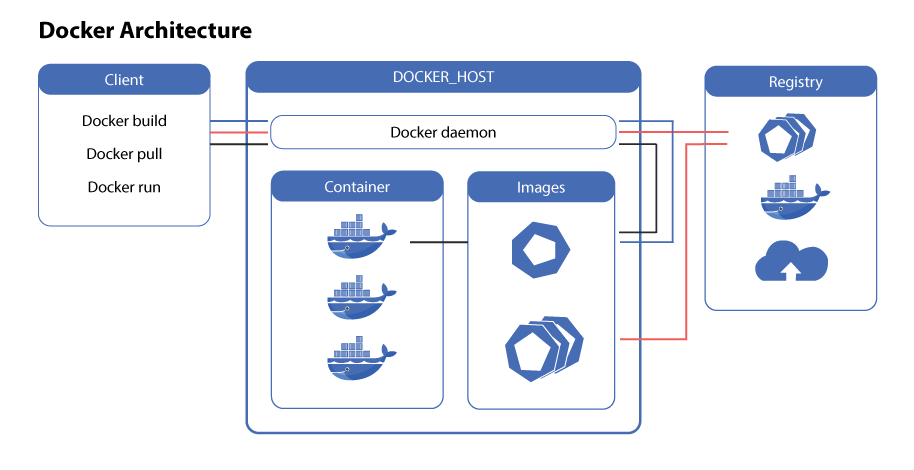
The architecture of Docker uses a client-server architecture. The Docker client talks to the Docker daemon, which then does the heavy lifting of building, running, and distributing the Docker containers.
Moreover, The Docker client and daemon architecture can easily run on the same system, or one can connect a Docker client to a remote Docker daemon.
Key Features of Docker:-
- Docker helps in better handling, executing of package deployed applications.
- Moreover, Docker Hub lets you explore many images from authentic publishers and communities.
- Features standardized packaging format for different apps.
- Above all, It features a container runtime that runs on different Windows and Linux servers Operating Systems.
Kubernetes
Kubernetes is a container orchestration platform founded by Google. This open-source system deals with containers on a large scale and tries to take containerization to a further level. Moreover, It helps in handling containerized apps into logical units for simple discovery and management, scaling, and automating deployment.

The architecture of Kubernetes is used to compose, scale, deploy as well as manage applications containers across host clusters.
Key Features of Kubernetes:-
- Runs on many hybrid platforms, on-premises, or public cloud hosting services.
- Moreover, Kubernetes can scale without extending your ops team.
- Above all, This degrades online server instances at the time of downstairs.
- Works on the master-slave concept.
- Works perfectly with Docker.
- Moreover, Can scale up web servers as per the demand for software apps.
Also Read:- Docker vs Kubernetes – A Detailed Comparison
Final Words
Since there are a lot of DevOps tools available for each and every phase of the DevOps development, one should have an in-depth knowledge of selecting the best tool according to the needs. Your choice of tool will completely depend on the teams’ involvement and the environment.
As mentioned above, the CodeStore team has helped you by listing some of the best ever DevOps tools which one should never ignore if they are planning to smoothen their business flow.
CodeStore Technologies is a leading mobile and web app development company with a special focus on providing the most efficient digital transformation services. Moreover, we help startups and other small business owners in taking their businesses to the next level.
Get in touch with us. Share your requirements at: [email protected].

